The Best Rap Projects Of 2022, Ranked
Including creative and inventive releases from Sarkodie, Show Dem Camp, Sampa the Great & more
Including creative and inventive releases from Sarkodie, Show Dem Camp, Sampa the Great & more
Once every few weeks, there’s a renewed conversation on the supposed deficiencies of Rap music in Africa. The catalysts are as varied as random beef or a comment from one of Afropop’s main superstars, but it almost always settles into rap’s perception as a genre lagging behind melodic Afropop and dance forms in terms of commercial impact. It’s a complex discussion with peculiar points in varying countries, but it would be a grave injustice to disregard the prolific, creative and inventive output happening across Africa’s Rap landscape. In fact, this year has seen an overflow of impressive rap projects, underlined by the ever evolving range of styles these artists bring to the table.
Stemming from its institution in the Bronx, Hip-Hop has seeped into the layered fabric of African music over the past three decades and successfully blended with the sounds from these parts, generating a fresh take with the already boundary-pushing sounds. Think Focalistic’s ever-exhilarating merger of Amapiano and rap, or Buruklyn Boyz infusing an urban Kenyan attitude into drill, or Kirani Ayat parsing rap through his Hausa heritage. The NATIVE editorial team’s list of the Best Rap Projects this year is a tribute to this infinite musical range, as well as the teeming brilliance in lyricism, narrative layout, unending flows, and an overall dedication to excellence.
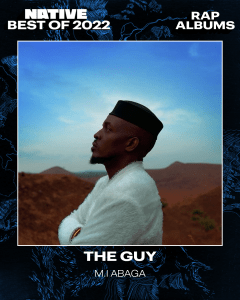
M.I Abaga is a perennial fixture in Nigerian (and African) rap, finding ways to remain musically and lyrically engaging even if his mainstream powers have declined from what they were this time a decade ago. This sort of longevity requires a boulder-size chip on your shoulder, which M.I gladly flaunts on ‘The Guy’, unvarnished evidence of an artist that has stayed true to his art and is relishing his current wins more than the past glories. Partly a return to the pop-rap dimension of his artistry, it’s the most accessible M.I project in eight years, packed with ultra-confident cuts with big hooks and feature-laden songs revelling in the glow of love—he got married this year, after all. In between are ruminations on legacy, the effects of toxic masculinity, and a closing song expressing an infectious joie de vivre.
Wonu Osikoya
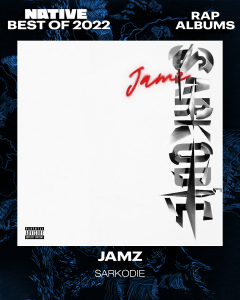
Sarkodie continues to tighten his grasp on the state of African Hip Hop affairs, and collaborations have been a major tool in his arsenal. ‘Jamz’ wholly explores the pop-rap direction he’s previously charted, calling on younger Afropop musicians to colour its seams. Featuring inspired performances from Lojay to King Promise, Ink Boy, Oxlade and Cina Soul among others, the music manages the pomp of festivity without feeling packed. The heart-pumping excesses of romantic love gives the Ghanaian music icon ample space to bend his Twi-laced considerations into form, with breezy productions casting a seaside vibe over its 35 minutes runtime. Yet there are moments of vulnerability, especially the BNXN-helmed closer “Better Days” which holds a torch over the well-documented struggles of the Tema-born rapper. When one’s caught in the fruity tangles of pleasure and good times, it’s normal after all, to reminisce on lesser-privileged moments.
Emmanuel Esomnofu
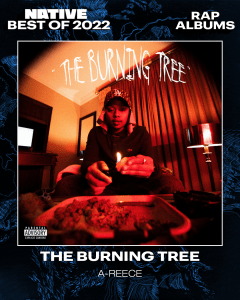
On ‘The Burning Tree’, his first of two solo projects this year, South African rapper A-Reece delivers a eulogy to the tantalising powers of marijuana. Although countless artists have made music inspired by their love for the herb—think Peter Tosh’s ‘Legalize It,’ Dr. Dre’s ‘The Chronic’ or Wiz Khalifa’s ‘Kush & Orange Juice’ & ‘Rolling Papers’—what makes ‘The Burning Tree’ far from a frivolous affair is A-Reece’s merger of personal struggles with exceptional rap skills. Across nine tracks, A-Reece and his guest artists shift from vulnerable to braggadocious, recalling childhood and adolescent travails to sending disses at opposing rappers who choose to ignore their proficiency in the booth. With bouncy drum packs and melodies that waft around leisurely, ‘The Burning Tree’ demands that you pay attention to a man confessing his love to his trusted companion.
Uzoma Ihejirika
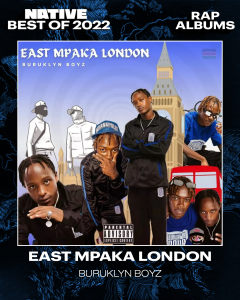
Immediately Buruklyn Boyz premiered the seminal “Nairobi”, they became the de-facto voices of Kenyan drill. Usually, that should come with some pressure, but Ajay and Mr Right have sauntered through expectations with subsequent releases, none more rousing than their debut album, ‘EAST MPAKA LONDON’. After over a year of building their credentials with great singles, some of them utterly essential to the Kenyan drill canon, they add a thrilling debut album to that repertoire. Over the course of the sprawling set, they reinvent as much as they stay tethered to their blueprint, adding some heart to the brawn they’ve always showcased, resulting in a dynamic album that collects the abilities of Ajay, Mr Right and their collaborators into a finely aggregated whole.
Dennis Ade Peter

Okmalumkoolkat has been an OG for a while, which would be an overwhelming advantage if the often colliding worlds of South African rap and dance music weren’t moving a mile a minute. For ‘uShukela eTiyeni’, he settles into being the cool uncle in exemplary fashion, exhibiting the essential tricks that brought him to ubiquity and finding pockets to fit in within more modish trends. There’s a bouncy depiction of being a family man, he masterfully whips his way through a minimalist trap beat, log drums find their way into the mix, and his mastery at rapping over the broken beats of gqom remain unparalleled. It’s the latest flex of greatness from a seminal talent.
Dennis Ade Peter
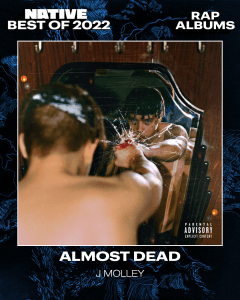
One of the attributes that makes J Molley stand out as a rapper is his voice, a droning tool that can communicate a range of emotions from hedonistic delight to existential dread. The South African rapper shared his most recent body of work, ‘Almost Dead’, earlier in the year and it quickly underlined his status as one of the most potent emo-rap purveyors on this side of the world. An immersive dunk into his mental space, where suicidal thoughts rub up against cutthroat raps, the 10-track project is an emotional rollercoaster. On a technical level, ‘Almost Dead’ is a statement of his forward-facing choices as a rap artist, with melodic flows snaking through the contours of trap slappers and drill excursions.
Wonu Osikoya
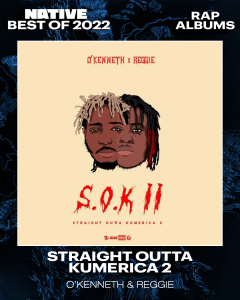
A follow-up to 2020’s formative Asakaa tape, ‘Straight Outta Kumerica’, Reggie and O’Kenneth return with their unique spin on Drill music, substituting the hard-hitting beats for a chill aura that incorporates acoustic guitars and Caribbean influences. Rapping in a mix of Twi, Hausa, Pidgin and English, they and their Ghanaian colleagues document their personal and musical journeys in their home city of Kumasi, particularly relishing their triumphs in the last few years. ‘Straight Outta Kumerica 2’ is proof that Reggie and O’Kenneth, along with their Asakaa counterparts responsible for the explosion of Drill music in Ghana, are not running out of ideas for pushing the genre forward anytime soon.
Uzoma Ihejirika
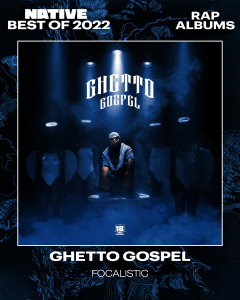
Championing the fusion of Amapiano and Rap, Focalistic has come into his own as an influential hit-maker. Even as he plays an integral role in the global incursion of ‘Piano, with Davido collaborations and international gigs, President Ya Straata keeps his music hood-oriented—specifically, Pretoria hood-specific. Like his other projects, ‘Ghetto Gospel’ blends the infectious sounds of Amapiano whilst retaining the artist’s ability to make straightforward rap songs, keeping the quips flowing in Sepitori. Where his last long play, ‘Sghubu Ses Excellent’, was breathless in its fusion and unyielding dancefloor intentions, Foca allows for moments of introspection that simmer, while also doubling down on his powers as an inimitable commandeer of droning, party-ready rhythms. ‘Ghetto Gospel’ keeps the streets fed.
Nwanneamaka Igwe
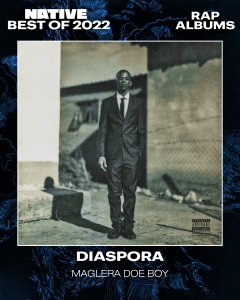
For Maglera Doe Boy, society and its attendant environment aren’t just backdrops—they’re active characters. That’s why he doesn’t just rep the hood in his music, he interrogates its matrix with relation to his life and the life choices he’s witnessed. Participant and keen observer, ‘Diaspora’ is littered with detailed stories of rugged events, songs depicting exuberant scenes, moments of breath-taking introspection and charming tenderness, Kwaito-influenced beats and serrated 808s. Referencing the displacing origins of South Africa’s townships—and also motioning towards parts of the global black experience—Maglera works in enough context to not pretend like he has all the answers, as he examines street politics and proclaims that “God is a Black Woman”. On the Ason-featuring “Dor Do Povo”, many of his raps are questions, but it’s obvious that there’s an incredible sense of clarity at play.
Dennis Ade Peter
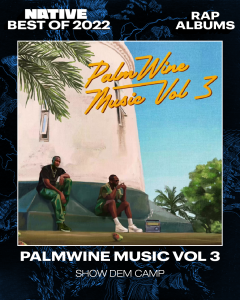
The last half-decade is packed with highlight reels strengthening Show Dem Camp’s mythos as arguably the greatest rap duo in Nigerian music history. This prolific run is commercially buoyed by their ‘Palmwine Music’ series where Tec and Ghost’s skill as rappers meets earworm guest hooks and colourful grooves inspired by highlife and entirely helmed by Spax. The third and final instalment in the series reaffirms the fact that no one is telling the tales and representing the rollercoaster nature of modern romance in Nigeria, with Lagos as an ever-present reference.
Amping up the thematic stakes, there’s depictions of toxicity, nail-biting drama, acerbic moments and rapping that ranges from joyfully vigorous to wistfully-toned. Featuring sweet-sounding collaborations from Victony, Tems, Oxlade, Boj, and many more, ‘PM3’ leaves listeners either with a great degree of accessibility with it’s message or longing for an experience they’ve never had—a feature at the core of rap and music in general.
Nwanneamaka Igwe
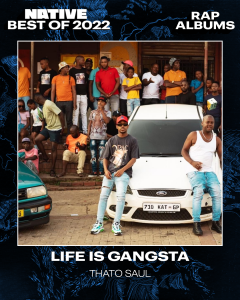
In rap, bravado is often used as a tool for exaggeration. For Saulsville-bred Thato Saul, bravado is a tool to make his reality raps even more searing. Always rapping at a purposefully frantic pace, with a cadence that makes everything he utters jab with the force of a stapler gun, every line is doused with a seen-it-all edge. On ‘Life is Gangsta’, his best-rounded project yet, posturing is grounded by honesty and each hood-related quip is from an earned lesson.
With quaking 808s and soulful melodic riffs, Thato Saul finds his groove as a song-making rap lyricist who can also turn in great hooks, but it’s the hands-on-bible truth telling that is the compelling gambit. “When it feels like depression, I pray to Jesus I fight this/really got G homies cutting their wrist, don’t wanna slice this,” he raps on the title track. It’s a gut-wrenching admission from a street-rap opus that represents the lives in his community and also offers intimate peeks into the rapper’s life.
Dennis Ade Peter
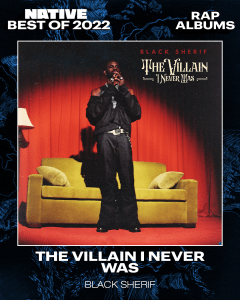
Vulnerability is a major part of the music Blacko creates. On the breakout duo of “First Sermon” and “Second Sermon”, Black Sherif is at his most honest and vulnerable but he masks this with hard hitting bars and his distinct vocal texture. Blacko is even more honest and very much more intentional on his debut album, ‘The Villian I Never Was.’ Across 14 tracks, the 20-year old rapper is consistent with his pen game, his flows and his melodies, and most importantly, Blacko is consistent with the delivery of the message and the storytelling.
The highlife influences on records such as “Oh Paradise” and “Don’t Forget Me” colours the tone of his delivery and the mellow rhythm of the records. Throughout the 40-minute run, Blacko displays honesty, making striking revelations across different records such as “The Homeless Song”, while pulling sonic cues from drill, emo-rap, reggae and more. ‘The Villian I Never Was’ is a letter from Black Sherif to the world; a letter in which he has used to document his pains, dreams and future aspirations.
Wonu Osikoya
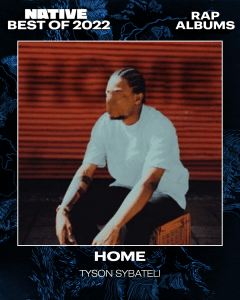
Discovering the music of Tyson Sybateli has been a highlight of my year. According to popular commentary on the state of rap music, the genre has entered an unprogressive ditch, creating uninspired, context-lacking records. If rap were to fight against those allegations, ‘Home’ would be inside the boxing ring before the opponent is ready. It’s an album with strong narrative verve and even stronger production to carry its ideals. Sybateli’s ethos is as real as they come; even when the beats are grand and highly fine-tuned, there’s a raw passion permeating verses.
He’s a lyricist with flair but also with an eye on the gritty life he’s meandered in South Africa, pulling all the stories into his broad canvas. “Bra Nyoga ‘Lude” bares his technical sleekness over a menacing beat as the rapper unfurls tales of familial history alongside his rap superiority. “Handouts” pairs Trap-tinged production with humour-laced admissions about being on the come-up and sparing no change for the needy. When Sybateli exhausts the fire in his punch, he incorporates the voices of MCs as diverse as he is (“Chauncy II”), a multiplicity which works to enrich the album with generational currency.
Emmanuel Esomnofu
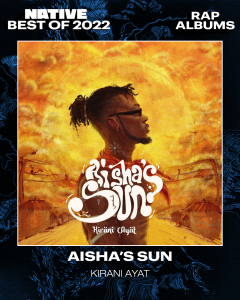
From the small community of Madina in Greater Accra, the rapper Kirani Ayat has embodied a stirring personality. His music encompasses the geographical and linguistic nuances of the region, with ‘Aisha’s Sun’ being the most accomplished of his explorations thus far. Being in the making as early as 2018, the project underwent a tonal and thematic change after the pandemic hit. Ayat’s vision was then pulled into the shifting nuances of being part of a community while furthering the instinctive urges of one’s own artistry.
He recorded parts of the album again, emerging with the lean-but-layered scope of ‘Aisha’s Sun.’ In just 22 minutes, the previously US-resident musician mints cultural currency into enduring portraits of strength. Vividly-produced, the soundscape borrows the lush influences of Hausa folk while culling in the boisterous intent of Trap. Kirani’s vocals also work to bolster the record’s replay value, whether he’s rapping about the strength of family or burnishing the credo of his trajectory and still-evolving craft.
Emmanuel Esomnofu
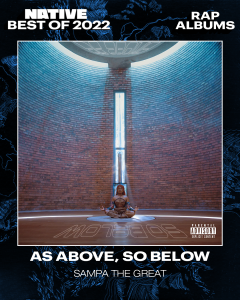
Home is where the love is. Home is where the hate is. Home is where the heart is. There’s no place like home. There are enough universal quotes to understand that what home truly means is ultimately personal, even if these relative values are widely relatable. The way Sampa the Great presents it on her excellent sophomore album, ‘As Above, So Below’, home is the catalyst for recalibration, the place that helps you step into your truest self away from the contrived pressures of the external world.
“You can do anything tryna forget who you are,” she sings on the positively haunting opener, “Shadows”. ‘As Above, So Below’ is an act of remembrance, of falling back in love with self and reconnecting with the purest source of inspiration possible. Inspired by her return and prolonged stay in Zambia amidst Covid-19 in 2020, Sampa’s reinvigoration is evident in its self-affirming core, pushing back against restrictive artistic perceptions with American rapper Denzel Curry, showing cultural pride in her momentous resurrection of Zamrock, being delightfully potty-mouthed alongside British rap artist Kojey Radical, and recruiting Beninese icon Angelique Kidjo for a blaring hook on the triumphant closer, “Let Me Be Great.”
‘As Above, So Below’ pulls in cross-continental vocal guests, but the music—it’s very soul—is mainly crafted with a core of Zambian collaborators, led by the revered Mag44, hopscotching across a kaleidoscopic musical blend, from folk and gospel-influenced flourishes to grungy and groovy choices with percussive stomp. The album’s heart and magnetic centre is Sampa the Great hell-bent on representing no one but herself, a premise executed to have as much spiritual significance as its visceral pull.
Dennis Ade Peter
Written by Emmanuel Esomnofu, Nwanneamaka Igwe, Wonu Osikoya, Tela Wangeci, Uzoma Ihejirika & Dennis Ade Peter.

